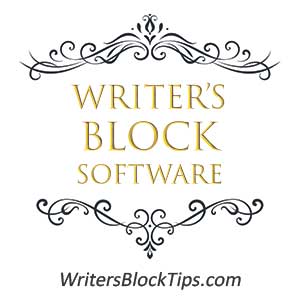Home » Writer’s Block Software
Writer’s Block Software – How to Deal With Writer’s Block
 For many writers, creative blocks are inevitable, but technology has revolutionized how we address these mental roadblocks. Writer’s block software provides tools to help writers overcome stagnation, organize their thoughts, and enhance productivity. These digital solutions offer everything from distraction-free environments to brainstorming aids, making it easier to conquer the blank page and focus on your craft.
For many writers, creative blocks are inevitable, but technology has revolutionized how we address these mental roadblocks. Writer’s block software provides tools to help writers overcome stagnation, organize their thoughts, and enhance productivity. These digital solutions offer everything from distraction-free environments to brainstorming aids, making it easier to conquer the blank page and focus on your craft.
In this article, we’ll dive into the features, types, and benefits of writer’s block software, exploring how these tools can empower writers to create with confidence and clarity. Created by a former literary agent who’s helped 400+ authors get literary agents and/or traditional book publishers as an author coach/consultant, this article is part of a guide about How to Cure Writer’s Block.
What Is Writer’s Block Software?
Writer’s block software is a category of tools designed to support writers in overcoming creative obstacles. By streamlining processes, fostering inspiration, and minimizing distractions, these programs help writers stay productive and focused.
Why Use Writer’s Block Software?
- Enhance Focus: Clear your mind of distractions and zero in on your writing.
- Spark Creativity: Access features that generate new ideas and angles.
- Stay Organized: Manage drafts, outlines, and research in one place.
- Boost Productivity: Overcome blocks and maintain momentum in your projects.
Whether you’re drafting a novel, creating marketing content, or journaling, writer’s block software adapts to your specific needs.
Types of Writer’s Block Software
Writer’s block software encompasses a variety of tools that address different aspects of the writing process. Below are the main categories and their benefits:
- Distraction-Free Writing Tools
When distractions derail productivity, these tools create a minimalist, focused environment to help writers concentrate. Features often include:
- Full-screen modes that eliminate visual clutter.
- Word count trackers to monitor progress.
- Timers for timed writing sessions.
Popular choices:
- FocusWriter: A distraction-free writing tool with a simple interface.
- Calmly Writer: Offers a clean workspace and auto-saving capabilities.
- Brainstorming and Idea Generation Tools
When creativity feels stagnant, brainstorming software can reignite inspiration. These tools help generate ideas, connect concepts, and develop fresh perspectives.
- Mind Mapping: Visualize your thoughts and link them in structured ways.
- Story Prompts: Programs that generate prompts tailored to your genre or project.
Popular choices:
- MindMeister: A mind-mapping tool to organize and expand ideas visually.
- Scapple: A freeform idea-mapping tool that lets you jot down and connect thoughts.
- Organizational Tools for Writers
Organizational software helps writers manage their projects, store research, and create outlines. These tools make it easy to keep track of ideas and deadlines, reducing the chaos that can contribute to writer’s block.
Popular choices:
- Scrivener: Designed for long-form writing, it allows you to outline, store notes, and draft all in one place.
- Evernote: A versatile app for managing notes and organizing research.
- Editing and Proofreading Tools
Editing software provides real-time grammar and style feedback, helping writers gain confidence in their work. These tools can also highlight areas for improvement, ensuring smoother revisions.
Popular choices:
- Grammarly: Checks for grammar errors, style inconsistencies, and readability.
- ProWritingAid: Offers in-depth analysis of writing quality and structure.
- Goal-Setting and Motivation Tools
Goal-setting apps keep writers accountable by tracking progress and encouraging consistency. Features often include:
- Daily word count targets.
- Streak trackers to motivate regular writing.
- Visual progress charts.
Popular choices:
- Pacemaker Planner: A customizable tool for setting and tracking writing goals.
- 4theWords: Combines writing with gamification, encouraging productivity through rewards.
Features to Look for in Writer’s Block Software
Selecting the right software depends on your needs, preferences, and writing goals. Here are some key features to consider:
- Customizability
Writers work differently, so a customizable interface can make all the difference. Look for software that allows you to adjust fonts, layouts, and themes to create a comfortable writing environment.
- Seamless Integration
Choose tools that integrate with your existing workflow. For example, software that syncs with cloud services like Google Drive or Dropbox ensures that your files are always accessible.
- Offline Functionality
If you often write in places without reliable internet access, offline capabilities are essential. This ensures uninterrupted work regardless of your location.
- Cross-Device Compatibility
Many writers switch between devices during the day. Opt for software that works across platforms—desktop, tablet, and smartphone—for seamless transitions.
- Collaboration Features
For writers working on collaborative projects, tools with commenting, sharing, and editing features can facilitate smooth teamwork.
Benefits of Writer’s Block Software
Incorporating writer’s block software into your routine offers significant advantages. Here’s how these tools can transform your writing process:
- Increased Focus and Efficiency
Distraction-free environments and timers help you stay on task, reducing procrastination and increasing productivity.
- Enhanced Creativity
Brainstorming tools and visual aids stimulate creative thinking, providing new angles and approaches to tackle your work.
- Reduced Overwhelm
Organizational features help break projects into manageable steps, making it easier to stay on track without feeling overwhelmed.
- Real-Time Feedback
Editing tools provide immediate insights into grammar, style, and readability, boosting confidence in your work.
- Motivation and Accountability
Goal-setting features keep you accountable and motivated, ensuring consistent progress over time.
How to Use Writer’s Block Software Effectively
To get the most out of writer’s block software, consider these tips:
- Start With a Free Trial
Many programs offer free trials or basic versions, allowing you to test their features before committing to a paid subscription.
- Identify Your Needs
Are you looking for inspiration, focus, or organization? Understanding your specific challenges will help you choose the right tool.
- Create a Routine
Incorporate software into your daily or weekly writing schedule. Consistency is key to overcoming writer’s block and building momentum.
- Combine Tools
Don’t limit yourself to one program. Combining brainstorming tools with editing software or goal-setting apps can create a comprehensive writing system.
- Reassess Regularly
As your projects and needs evolve, revisit your software choices to ensure they’re still meeting your requirements.
Writer’s Block Software for Different Writing Styles
Different types of writing require different tools. Here are recommendations based on specific genres and writing styles:
Fiction Writers
Fiction writers benefit from tools that help with plotting and world-building.
- World Anvil: Ideal for developing fictional worlds.
- Plottr: A visual tool for organizing story arcs and character development.
Nonfiction Writers
Nonfiction authors need tools for managing research and creating structured content.
- Scrivener: Perfect for organizing large projects like books or essays.
- Evernote: Great for storing and referencing research materials.
Bloggers and Content Creators
Bloggers often need distraction-free tools and editing software to produce polished posts.
- Grammarly: Ensures professional-quality content.
- Hemingway Editor: Simplifies sentences and improves readability.
Screenwriters
Screenwriting software should include formatting and collaboration features.
- Final Draft: Industry-standard software for screenwriting.
- Celtx: A budget-friendly alternative with collaboration tools.
Conclusion – Writer’s Block Software
Writer’s block software is an invaluable asset for anyone looking to navigate creative roadblocks and improve their writing process. By offering tools tailored to focus, organization, and creativity, these programs provide the structure and inspiration needed to transform writing challenges into opportunities for growth.
Whether you’re crafting the next great novel, drafting blog posts, or organizing complex research, the right writer’s block software can streamline your efforts and help you produce your best work. Explore your options, integrate them into your routine, and watch as your productivity and creativity soar.
Now that you’ve read “Writer’s Block Software,” click here to read “Books for Writer’s Block.”
Writer’s Block Tips – How to Cure Writer’s Block
- What Is Writer’s Block?
- Causes of Writer’s Block
- Prompts to Get Rid of Writer’s Block
- 5 AI Prompts to Get Rid of Writer’s Block
- Writer’s Block Software
- Books for Writer’s Block
- Mantra for Writer’s Block
- Meditation for Writer’s Block
- Inspiration for Writer’s Block
- How to Avoid Writer’s Block
- Quotes About Writer’s Block
- Famous Authors and Writers Block
Writer’s Block Help – The Bestselling Author, LLC
 This guide about How to Get Out of Writer’s Block was created by The Bestselling Author, LLC, a coaching and consulting company established in 2011 that’s helped 400+ writers get literary agents and/or traditional publishers. Mark Malatesta, the founder, is a former: literary agent, literary agency owner, AAR member, and Marketing & Licensing Manager for the gift and book publisher Blue Mountain Arts.
This guide about How to Get Out of Writer’s Block was created by The Bestselling Author, LLC, a coaching and consulting company established in 2011 that’s helped 400+ writers get literary agents and/or traditional publishers. Mark Malatesta, the founder, is a former: literary agent, literary agency owner, AAR member, and Marketing & Licensing Manager for the gift and book publisher Blue Mountain Arts.
Writers Mark has worked with include Scott LeRette, author of The Unbreakable Boy, published by Thomas Nelson and now a major motion picture by Lionsgate starring Patricia Heaton, Zachary Levi, and Amy Acker; Nelson Johnson, author of Boardwalk Empire, which Martin Scorsese produced for HBO; and Leslie Lehr, author of A Boob’s Life, which is being adapted for an HBO Max TV series by Salma Hayek. Click here for Mark Malatesta reviews by authors Mark has worked with, and publishing industry professionals.
Interviews/Tips from Successful Authors
Children's Books
Chapter Book - J. Agee
Picture Book - M. Leshem-Pelly
Young Adult - C. Plum-Ucci
Young Adult - D. Bester
Young Adult - L. Moe
Fiction/Novels
BIPOC Fiction - H. August
Christian Fiction - K. Sargent
Crime/Mystery Fiction - B. Harper
Mystery/Thriller Fiction - J. Brown
General/Upmarket Fiction - J. Jago
General Fiction - K. Cox
Thriller Fiction - C. LePort
Memoir/Autobiography
Addiction/Recovery - M. Bond
Animals/Inspirational - K. Finley
BIPOC/Inspirational - D. Tolson
BIPOC/Inspirational - L. Subramani
BIPOC/Inspirational - N. Aronheim
Christian/Inspirational - S. LeRette
Family/Identity/Holocaust - S. Foti
Women's/Mainstream - E. Armstrong
Narrative Nonfiction
Christian/Inspirational - J. Stansifer
Historical - N. Johnson
Holocaust/Inspirational - D. Cohen
Military/War - M. Croissant
Women's Issues - L. Lehr
Nonfiction Books
Business - D. Hamme
Diversity - S. Peer
Environment - J. Biemer
Health/Nutrition - M. Hill
Self-Help - A. Obayuwana
Mental Health/Medical - R. Smith
Self-Help/Women - A. Goddard
Self-Help/Spirituality - M. Battista
You'll also get free access to our Author Resource Library

